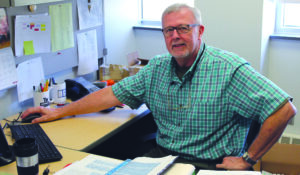
Not every professor has secret clearance for the U.S.
Mark Jager, the new instructor of materials and welding technology, was born and raised in the city of East Detroit — now known as Eastpointe.
Jager said he had a normal 1950s and 1960s upbringing.
“You know, had a very close family, played some sports, nothing really eventful,” Jager said.
Jager’s father, Alvin, was a police officer, while his mother, Joanne, was a stay-at-home mom.
Unsure of what he wanted to do in life, Jager said he took to welding during high school and continued working with it during college.
“I went to community college up in Macomb and got a two-year degree in metallurgical science technology,” Jager said.
It wasn’t the sparks that fascinated him though, Jager said. It was understanding the physical and chemical behavior of metals at the atomic level, metallurgy.
Jager credits the associate program for starting the fire in his love for the field.
“Then I went on to Wayne State (University) and I got my Bachelor of Science in metallurgical engineering.”
After achieving his bachelor’s degree, Jager said he did graduate work at the Hartford Graduate Center for the Electric Boat Company where he worked on nuclear submarines.
“When I first took the interview at Electric Boat, I thought we would be making pleasure craft or something like that,” Jager said.
It wasn’t until he started reading into Electric Boat that he discovered the company made submarines and had government contracts, which required secret clearance.
Jager obtained secret clearance from the Department of Energy as well as the Department of Defense.
“They checked my background, called my family, and called people I had associated with. I guess I cleared it ok,” Jager joked.
During his time at Electric Boat, Jager said he worked on the USS Michigan, the second ballistic missile submarine in the Ohio-class.
“They called them super boomers because they could launch 24 trident missiles, with 10 individually targeted nuclear warheads,” Jager said. “Basically, you had 240 nuclear warheads coming out of a submarine.”
“My first job there was qualifying the seal weld around the nuclear reactor,” he said.
Jager also worked on fast-attack submarines and went on two sea trials.
On the trials, they tested how deep the submarine could go.
“I hope the welds hold up,” Jager remembers saying to himself as the submarine creaked from pressure.
Jager said students always perk up when he brings up a story about Electric Boat.
“I was excited to have someone with the experience and knowledge,” said Kyle Haener, a student of Jager’s. “I was shocked, though.”
After leaving Electric Boat, Jager worked at Tenneco starting as a metallurgical engineer.
He then became a supervisor and worked his way to become a global materials engineer manager, where he oversaw material use and purchasing.
“As a global manager I had people reporting to me from China, India and Poland,” Jager said.
Jager said he would get up around 4 a.m. and start looking at emails from all over the world.
During his time at Tenneco, Jager also worked as an adjunct professor at Macomb Community College teaching their metallurgy program.
After getting a taste of being a professor and retiring from Tenneco, Jager said he wanted to get back into teaching and wanted to give back to the profession.
Then a position at MCCC opened.
“When this opportunity presented itself as an adjunct, I liked it, and when the opportunity (came) for full-time, I took advantage of it,” Jager said.
He also credits MCCC’s strong alumni as part of what led him here.
“At Tenneco, I had several guys who worked for me that went to the community college. They were good people. They were trained very well.”
Jager said he likes to focus on the science of welding and metallurgy instead of only the business of it.
“He’s very knowledgeable and good with his demonstrations, they’re practical,” Haener said.
Expanding connections with businesses and companies for students to work for after college is one of his goals, Jager said.
He said he would also like to get newer equipment for the lab and conduct tours of welding shops to see the profession in action.
“We call it sparks and arcs,” Jager laughed.
In his spare time, Jager enjoys spending time with his wife Linda, and when able, they go to northern Virginia to see their sons Mark and Nicholas.
Mark served in the Army and works for the Library of Congress in Washington, D.C. Nicholas served in the Coast Guard and works as a diplomat in the state department. He is currently in India.
Jager also reads about historical events and considers himself a history buff. He focuses on American history and early 18th and 19th century technology.
“What fascinates me is how something can be made in the 1800s and still function.”
Jager said he thought about assisting friends with historical reenactments, but joked about being afraid he would enjoy it too much and spend a lot of money on gear.
From both personal, academic and professional encounters, he could be considered a human storybook.
“It’s good to be back in the academic world where you’re able to teach people and share your experiences.”

